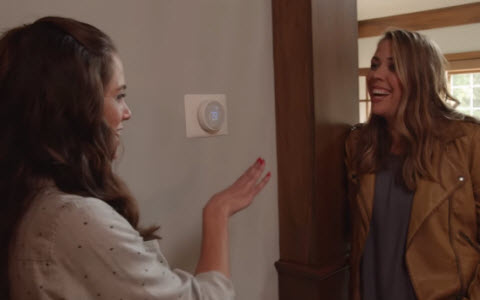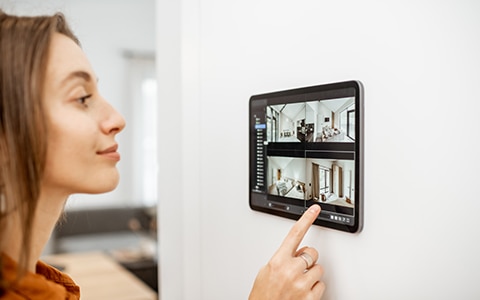How Smart Home Technology Helps Protect Your Home [Video]
Smart home technology offers ease and convenience, allowing you to do things like turn lights on and off automatically while you're on vacation or see who's at your front door while you're at work. But you may not know it also can help protect your home and reduce home insurance costs.
How? In addition to helping to make life easier and give you greater peace of mind, smart home technology can help you protect your home and your possessions from fires, theft and other types of damage.
Why Use Smart Home Technology in Your Home?
Nearly six out of 10 consumers say they would buy a smart home device that could detect a problem, alert them to an issue or prevent damage in the home.1 If you're trying to decide if smart home technology is right for you, it may be helpful to know more about what kinds of smart home technology are available today and why some homeowners find them useful.
If you're building a new home or planning a major renovation to your current living space, it is possible to have a contractor install an entire smart home system. However, many homeowners begin with one or a few pieces of smart technology to serve a specific function or get a feel for how smart home tech works. Here are some of the most common smart home technologies that may help you protect your home:1
Smart Water Damage Prevention: Some smart home devices will detect and alert a homeowner to leaks from sources such as burst pipes, overflowing bathtubs and malfunctioning dishwashers. In some cases, a homeowner might not notice leaks from these sources until extensive damage has been done.
A smart leak detector uses sensors to detect changes in flow in your water pipes or the accumulation of water and alert the homeowner to help stop the leak as quickly as possible. Some smart leak detectors will even shut off the water immediately. This can be helpful in protecting your home because property damage caused by nonweather events, such as burst pipes, is a leading cause of loss in the home.
Smart Fire Detection: Traditional smoke detectors save lives and they work well when you're home to hear the alarm, whether you've just burned a casserole, or your home is actually on fire. A smart smoke detector works similarly to a traditional one, with one big difference: a smart smoke detector can send an alert to your smartphone when the alarm goes off, so you’re notified even when you are away from home. This notification may help you to notify the local fire department sooner than if you had to wait until neighbors noticed smoke or flames.
Fire and lightning damage are an expensive cause of property damage for homeowners. A device that alerts you when you’re away may help you minimize the amount of damage. Fires can be especially devastating for homeowners, resulting in the loss of home and possessions and requiring you to find lodging during rebuilding.2 A homeowners insurance policy with alternative living expenses (ALE) coverage may help to pay for a hotel or other place to stay.
Smart Home Security: Traditional home security systems can alert authorities in case of a break-in, but smart security technology lets you keep an eye on your home from afar. There are various smart home technologies that are meant to help with home security. You can buy a smart home security system that has multiple components. Some smart home security systems include window sensors, motion detectors and sirens. Systems vary, and some allow you to connect to an alarm company while others do not.
You do have the option to start small instead of installing an entire system. A smart door lock will allow you to open and close your front door using your phone. A smart home security camera will allow you to monitor different areas of your home while you're away. And a smart doorbell will let you see who's at your front door by checking your smartphone. When you consider that theft is among the top five most common losses for homeowners, smart home technology may be a helpful layer of security to add to your home.
Travelers Insurance allows you to customize your coverage to fit your unique needs. We focus on understanding you, so you'll feel right at home working with us.


Risks of Smart Home Technology
Smart home technology may sound like a clever way to protect your home and belongings, but homeowners should also be aware of the downside. First, smart home technology may be vulnerable to hacking. This means that the technology that's intended to protect you could provide an opening for a criminal to gain access to your home.
Second, smart home technology, like any other type of technology, may malfunction. For example, your living room lights may fail to turn off due to network connectivity issues. You’ll want to make sure you have good equipment for your wireless network, like a high-grade wireless router, but be aware that technical difficulties may occur from time to time.
For these reasons, it's important to do extensive research before you purchase smart home technology. Take the time to do your own research to learn more about the challenges and research another example of the benefits of smart home technology. There are many consumer resources available to help you learn more about the potential benefits and risks of the technology.
Can You Get a Smart Home Insurance Discount?
Home insurers have long offered discounts to homeowners who use tools and services that keep their homes safer and more secure. For example, insurance companies often offer discounts for home security systems that discourage or prevent home break-ins.
Some insurance companies offer discounts specifically for certain types of smart home technology. For example, Travelers offers a protective device discount that includes smart home technology that alerts you to events such as a burglary or fire.
Are you considering adding smart home tech to your home or do you already have some smart technology and wonder if it qualifies you for a discount on your home insurance? Contact Travelers and find out how smart home technology may be able to help you save on home insurance and ask for a quote.
Sources:
1 https://www.insurancejournal.com/research/app/uploads/2018/03/Parks-Assoc-Market-Snapshot-Insurance-2018.pdf
2 https://www.irmi.com/articles/expert-commentary/adjusting-residential-house-fires
More Tools & Resources

How to Set Up Smart Smoke Detectors [Video]
Fire is one of the most expensive risks for homeowners. Join us at the CNET Smart Home® to see how easy it is to add a smart smoke detector to your home.
Paid Content

Making Your New Home a Smart Home [Video]
Mandi Gubler joins Stephanie Duchaine at the CNET Smart Home® to look at smart home tech that can help turn your new home into a smart home.
Paid content

How to Help Protect Your Smart Home From Hackers
Are you enjoying the convenience of a virtual assistant, smart appliance, smart home security, or smart lighting? Here are some steps you can take to make it harder for your smart home to be hacked.